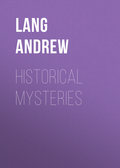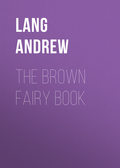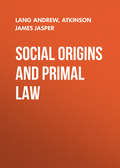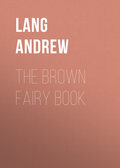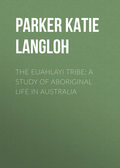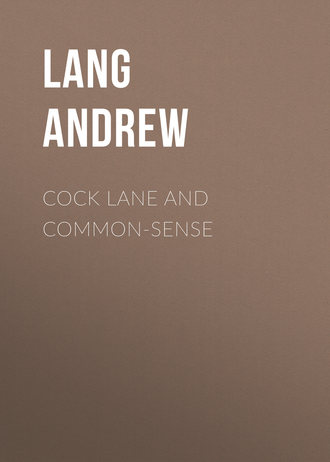
Lang Andrew
Cock Lane and Common-Sense
No doubt when, if ever, a very large and imposing body of these reports is presented by a cloud of scientific witnesses of esteemed reputation, then official science will give more time and study to the topic than it is at present inclined to bestow. Mr. Wallace has asserted that, ‘whenever the scientific men of any age have denied, on a priori grounds, the facts of investigation, they have always been wrong’. 8 He adds that Galileo, Harvey, Jenner, Franklin, Young, and Arago, when he ‘wanted even to discuss the subject of the electric telegraph,’ were ‘vehemently opposed by their scientific contemporaries,’ ‘laughed at as dreamers,’ ‘ridiculed,’ and so on, like the early observers of palæolithic axes, and similar prehistoric remains. This is true, of course, but, because some correct ideas were laughed at, it does not follow that whatever is laughed at is correct. The squarers of the circle, the discoverers of perpetual motion, the inquirers into the origin of language, have all been ridiculed, and ruled out of court, the two former classes, at least, justly enough. Now official science apparently regards all the long and universally rumoured abnormal occurrences as in the same category with Keely’s Motor, and Perpetual Motion, not as in the same category with the undulatory theory of light, or the theory of the circulation of the blood. Clairvoyance, or ghosts, or suspensions of the law of gravitation, are things so widely contradictory of general experience and of ascertained laws, that they are pronounced to be impossible; like perpetual motion they are not admitted to a hearing.
As for the undeniable phenomenon that, in every land, age, and condition of culture, and in every stage of belief or disbelief, some observers have persistently asserted their experience of these occurrences; as for the phenomenon that the testimonies of Australian blacks, of Samoyeds, of Hurons, of Greeks, of European peasants, of the Catholic and the Covenanting clergy, and of some scientifically trained modern physicians and chemists, are all coincident, official physical science leaves these things to anthropology and folklore. Yet the coincidence of such strange testimony is a singular fact in human nature. Even people of open mind can, at present, say no more than that there is a great deal of smoke, a puzzling quantity, if there be no fire, and that either human nature is very easily deluded by simple conjuring tricks, or that, in all stages of culture, minds are subject to identical hallucinations. The whole hocus-pocus of ‘spirit-writing’ on slates and in pellets of paper, has been satisfactorily exposed and explained, as a rather simple kind of leger-de-main. But this was a purely modern sort of trickery; the old universal class of useless miracles, said to occur spontaneously, still presents problems of undeniable psychological interest.
For example, if it be granted, as apparently it was by Dr. Carpenter, that, in certain circumstances, certain persons, wide awake, can perform, in various ways, intelligent actions, and produce intelligent expressions automatically, without being conscious of what they are doing, then that fact is nearly as interesting and useful as the fact that we are descended from protozoa. Thus Dr. Carpenter says that, in ‘table-talking,’ ‘cases have occasionally occurred in the experience of persons above suspicion of intentional deception, in which the answers given by the movements of tables were not only unknown to the questioners, but were even contrary to their belief at the time, and yet afterwards proved to be true. Such cases afford typical examples of the doctrine of unconscious cerebration, for in several of them it was capable of being distinctly shown that the answers, although contrary to the belief of the questioners at the time, were true to facts of which they had been formerly cognisant, but which had vanished from their recollection; the residua of these forgotten impressions giving rise to cerebral changes which prompted the responses without any consciousness on the part of the agents of the latent springs of their actions.’ It is, apparently, to be understood that, as the existence of latent unconscious knowledge was traced in ‘several’ cases, therefore the explanation held good in all cases, even where it could not be established as a fact.
Let us see how this theory works out in practice. Smith, Jones, Brown and Robinson are sitting with their hands on a table. All, ex hypothesi, are honourable men, ‘above suspicion of intentional deception’. They ask the table where Green is. Smith, Jones and Robinson have no idea, Brown firmly believes that Green is in Rome. The table begins to move, kicks and answers, by aid of an alphabet and knocks, that Green is at Machrihanish, where, on investigation, he is proved to be. Later, Brown is able to show (let us hope by documentary evidence), that he had heard Green was going to Machrihanish, instead of to Rome as he had intended, but this remarkable change of plans on Green’s part had entirely faded from Brown’s memory. Now we are to take it, ex hypothesi, that Brown is the soul of honour, and, like Mr. Facey Rumford, ‘wouldn’t tell a lie if it was ever so’. The practical result is that, while Brown’s consciousness informs him, trumpet-tongued, that Green is at Rome, ‘the residue of a forgotten impression’ makes him (without his knowing it) wag the table, which he does not intend to do, and forces him to say through the tilts of the table, that Green is at Machrihanish, while he believes that Green is at Rome.
The table-turners were laughed at, and many, if not all of them, deserved ridicule. But see how even this trivial superstition illuminates our knowledge of the human mind! A mere residuum of a forgotten impression, a lost memory which Brown would have sworn, in a court of justice, had never been in his mind at all, can work his muscles, while he supposes that they are not working, can make a table move at which three other honourable men are sitting, and can tell all of them what none of them knows. Clearly the expedient of table-turning in court might be tried by conscientious witnesses, who have forgotten the circumstances on which they are asked to give evidence. As Dr. Carpenter remarks, quoting Mr. Lecky, ‘our doctrine of unconscious cerebration inculcates toleration for differences not merely of belief, but of the moral standard’. And why not toleration for ‘immoral’ actions? If Brown’s residuum of an impression can make Brown’s muscles move a table to give responses of which he is ignorant, why should not the residuum of a forgotten impression that it would be a pleasant thing to shoot Mr. Gladstone or Lord Salisbury, make Brown unconsciously commit that solecism? It is a question of degree. At all events, if the unconscious self can do as much as Dr. Carpenter believed, we cannot tell how many other marvels it may perform; we cannot know till we investigate further. If this be so, it is, perhaps, hardly wise or scientific to taboo all investigation. If a mere trivial drawing-room amusement, associated by some with an absurd ‘animistic hypothesis,’ can, when explained by Dr. Carpenter, throw such unexpectedly blinding light on human nature, who knows how much light may be obtained from a research into more serious and widely diffused superstitious practices? The research is, undeniably, beset with the most thorny of difficulties. Yet whosoever agrees with Dr. Carpenter must admit that, after one discovery so singular as ‘unconscious cerebration,’ in its effect on tables, some one is bound to go further in the same field, and try for more. We are assuming, for the sake of argument, the accuracy of Dr. Carpenter’s facts. 9
More than twenty years ago an attempt was made by a body called the ‘Dialectical Society,’ to investigate the phenomena styled spiritualistic. This well-meant essay had most unsatisfactory results. 10
First a committee of inquiry was formed, on the motion of Dr. Edmunds. The committee was heterogeneous. Many of the names now suggest little to the reader. Mr. Bradlaugh we remember, but he chiefly attended a committee which sat with D. D. Home, and it is admitted that nothing of interest there occurred. Then we find the Rev. Maurice Davies, who was wont to write books of little distinction on semi-religious topics. Mr. H. G. Atkinson was a person interested in mesmerism. Kisch, Moss, and Quelch, with Dyte and Isaac Meyers, Bergheim and Geary, Hannah, Hillier, Reed (their names go naturally in blank verse), were, doubtless, all most estimable men, but scarcely boast of scientific fame. Serjeant Cox, a believer in the phenomena, if not in their spiritual cause, was of the company, as was Mr. Jencken, who married one of the Miss Foxes, the first authors of modern thaumaturgy. Professor Huxley and Mr. G. H. Lewes were asked to join, but declined to march to Sarras, the spiritual city, with the committee. This was neither surprising nor reprehensible, but Professor Huxley’s letter of refusal appears to indicate that matters of interest, and, perhaps, logic, are differently understood by men of science and men of letters. 11 He gave two reasons for refusing, and others may readily be imagined by the sympathetic observer. The first was that he had no time for an inquiry involving much trouble, and (as he justly foresaw) much annoyance. Next, he had no interest in the subject. He had once examined a case of ‘spiritualism,’ and detected an imposture. ‘But, supposing the phenomena to be genuine, they do not interest me. If anybody would endow me with the faculty of listening to the chatter of old women and curates in the nearest cathedral town, I should decline the privilege, having better things to do.’ Thus it would not interest Professor Huxley if some new kind of telephone should enable him to hear all the conversation of persons in a town (if a cathedral town) more or less distant. He would not be interested by the ‘genuine’ fact of this extension of his faculties, because he would not expect to be amused or instructed by the contents of what he heard. Of course he was not invited to listen to a chatter, which, on one hypothesis, was that of the dead, but to help to ascertain whether or not there were any genuine facts of an unusual nature, which some persons explained by the animistic hypothesis. To mere ‘bellettristic triflers’ the existence of genuine abnormal and unexplained facts seems to have been the object of inquiry, and we must penitently admit that if genuine communications could really be opened with the dead, we would regard the circumstance with some degree of curious zest, even if the dead were on the intellectual level of curates and old women. Besides, all old women are not imbeciles, history records cases of a different kind, and even some curates are as intelligent as the apes, whose anatomy and customs, about that time, much occupied Professor Huxley. In Balaam’s conversation with his ass, it was not so much the fact that mon âne parle bien which interested the prophet, as the circumstance that mon âne parle. Science has obviously soared very high, when she cannot be interested by the fact (if a fact) that the dead are communicating with us, apart from the value of what they choose to say.
However, Professor Huxley lost nothing by not joining the committee of the Dialectical Society. Mr. G. H. Lewes, for his part, hoped that with Mr. Alfred Russel Wallace to aid (for he joined the committee) and with Mr. Crookes (who apparently did not) ‘we have a right to expect some definite result’. Any expectation of that kind was doomed to disappointment. In Mr. Lewes’s own experience, which was large, ‘the means have always been proved to be either deliberate imposture.. or the well-known effects of expectant attention’. That is, when Lord Adare, the Master of Lindsay, and a cloud of other witnesses, thought they saw heavy bodies moving about of their own free will, either somebody cheated, or the spectators beheld what they did behold, because they expected to do so, even when, like M. Alphonse Karr, and Mr. Hamilton Aide, they expected nothing of the kind. This would be Mr. Lewes’s natural explanation of the circumstances, suggested by his own large experience.
The results of the Dialectical Society’s inquiry were somewhat comic. The committee reported that marvels were alleged, by the experimental subcommittees, to have occurred. Sub-committee No. 1 averred that ‘motion may be produced in solid bodies without material contact, by some hitherto unrecognised force’. Sub-committees 2 and 3 had many communications with mysterious intelligences to vouch for, and much erratic behaviour on the part of tables to record. No. 4 had nothing to report at all, and No. 5 which sat four times with Home had mere trifles of raps. Home was ill, and the séances were given up.
So far, many curious phenomena were alleged to have occurred, but now Dr. Edmunds, who started the whole inquiry, sent in a separate report. He complained that convinced spiritualists had ‘captured’ the editing sub-committee, as people say, and had issued a report practically spiritualistic. He himself had met nothing more remarkable than impudent frauds or total failure. ‘Raps, noises, and movements of various kinds,’ he had indeed witnessed, and he heard wondrous tales from truthful people, ‘but I have never been able to see anything worthy of consideration, as not being accounted for by unconscious action, delusion, or imposture’. Then the editors of the Report contradicted Dr. Edmunds on points of fact, and Mr. A. R. Wallace disabled his logic, 12 and Mr. Geary dissented from the Report, and the editors said that his statements were incorrect, and that he was a rare attendant at séances, and Serjeant Cox vouched for more miracles, and a great many statements of the most astounding description were made by Mr. Varley, an electrician, by D. D. Home, by the Master of Lindsay (Lord Crawford) and by other witnesses who had seen Home grow eight inches longer and also shorter than his average height; fly in the air; handle burning coals unharmed, cause fragrance of various sweet scents to fill a room, and, in short, rival St. Joseph of Cupertino in all his most characteristic performances. Unluckily Mr. Home, not being in the vein, did not one of these feats in presence of Mr. Bradlaugh and sub-committee No. 5. These results are clearly not of a convincing and harmonious description, and thus ended the attempt of the Dialectical Society. Nobody can do otherwise than congratulate Professor Huxley and Mr. Lewes, on their discreet reserve. The inquiry of the Dialectical Society was a failure; the members of the committees remained at variance; and it is natural to side with the sceptics rather than with those who believed from the first, or were converted (as many are said to have been) during the experiments. Perhaps all such inquiries may end in no more than diversity of opinion. These practical researches ought not to be attempted by the majority of people, if by any. On many nervous systems, the mere sitting idly round a table, and calling the process a séance, produces evil effects.
As to the idea of purposely evoking the dead, it is at least as impious, as absurd, as odious to taste and sentiment, as it is insane in the eyes of reason. This protest the writer feels obliged to make, for while he regards the traditional, historical and anthropological curiosities here collected as matters of some interest, in various aspects, he has nothing but abhorrence and contempt for modern efforts to converse with the manes, and for all the profane impostures of ‘spiritualism’.
On the question of the real existence of the reported phenomena hereafter chronicled, and on the question of the portée of the facts, if genuine, the writer has been unable to reach any conclusion, negative or affirmative. Even the testimony of his senses, if they ever bore witness to any of the speciosa miracula, would fail to convince him on the affirmative side. There seems to be no good reason why one observer should set so much store by his own impressions of sense, while he regards those of all other witnesses as fallible. On the other hand, the writer feels unable to set wholly aside the concurrent testimony of the most diverse people, in times, lands and conditions of opinion the most various. The reported phenomena fall into regular groups, like the symptoms of a disease. Is it a disease of observation? If so, the topic is one of undeniable psychological interest. To urge this truth, to produce such examples as his reading affords, is the purpose of the author.
The topic has an historical aspect. In what sorts of periods, in what conditions of general thought and belief, are the alleged abnormal phenomena most current? Every one will answer: In ages and lands of ignorance and superstitions; or, again: In periods of religious, or, so to say, of irreligious crisis. As Mr. Lecky insists, belief in all such matters, from fairies to the miracles of the Gospel, declines as rationalism or enlightenment advances. Yet it is not as Mr. Lecky says, before reason that they vanish, not before learned argument and examination, but just before a kind of sentiment, or instinct, or feeling, that events contradictory of normal experience seem ridiculous, and incredible.
Now, if we set aside, for the present, ecclesiastical miracles, and judicial witchcraft, and fix our attention on such minor and useless marvels as clairvoyance, ‘ghosts,’ unexplained noises, unexplained movements of objects, one doubts whether the general opinion as to the ratio of marvels and ignorance is correct. The truth is that we have often very scanty evidence. If we take Athens in her lustre, we are, undeniably, in an age of enlightenment, of the Aufklärung. No rationalistic, philosophical, cool-headed contemporary of Middleton, of Hume, of Voltaire, could speak more contemptuously about ghosts, and about the immortality of the soul, than some of the Athenian gentlemen who converse with Socrates in the Dialogues. Yet we find that Socrates and Plato, men as well educated, as familiar with the refined enlightenment of Athens as the others, take to some extent the side of the old wives with their fables, and believe in earth-bound spirits of the dead. Again, the clear-headed Socrates, one of the pioneers of logic, credits himself with ‘premonitions,’ apparently with clairvoyance, and assuredly with warnings which, in the then existing state of psychology, he could only regard as ‘spiritual’. Hence we must infer that belief, or disbelief, does not depend on education, enlightenment, pure reason, but on personal character and genius. The same proportionate distribution of these is likely to recur in any age.
Once more, Rome in the late Republic, the Rome of Cicero, was ‘enlightened,’ as was the Greece of Lucian; that is the educated classes were enlightened. Yet Lucretius, writing only for the educated classes, feels obliged to combat the belief in ghosts and the kind of Calvinism which, but for his poem, we should not know to have been widely prevalent. Lucian, too, mocks frequently at educated belief in just such minor and useless miracles as we are considering, but then Lucian lived in an age of cataclysm in religion. Looking back on history we find that most of historical time has either been covered with dark ignorance, among savages, among the populace, or in all classes; or, on the other hand, has been marked by enlightenment, which has produced, or accompanied, religious or irreligious crises. Now religious and irreligious crises both tend to beget belief in abnormal occurrences. Religion welcomes them as miracles divine or diabolical. Scepticism produces a reaction, and ‘where no gods are spectres walk’. Thus men cannot, or, so far, men have not been able to escape from the conditions in which marvels flourish. If we are savages, then Vuis and Brewin beset the forest paths and knock in the lacustrine dwelling perched like a nest on reeds above the water; tornaks rout in the Eskimo hut, in the open wood, in the gunyeh, in the Medicine Lodge. If we are European peasants, we hear the Brownie at work, and see the fairies dance in their grassy ring. If we are devoutly Catholic we behold saints floating in mid-air, or we lay down our maladies and leave our crutches at Lourdes. If we are personally religious, and pass days in prayer, we hear voices like Bunyan; see visions like the brave Colonel Gardiner or like Pascal; walk environed by an atmosphere of light, like the seers in Iamblichus, and like a very savoury Covenanting Christian. We are attended by a virtuous sprite who raps and moves tables as was a pious man mentioned by Bodin and a minister cited by Wodrow. We work miracles and prophesy, like Mr. Blair of St. Andrews (1639-1662); we are clairvoyant, like Mr. Cameron, minister of Lochend, or Loch-Head, in Kintyre (1679). If we are dissolute, and irreligious like Lord Lyttelton, or like Middleton, that enemy of Covenanters, we see ghosts, as they did, and have premonitions. If we live in a time of witty scepticism, we take to the magnetism of Mesmer. If we exist in a period of learned and scientific scepticism, and are ourselves trained observers, we may still watch the beliefs of Mr. Wallace and the experiments witnessed by Mr. Crookes and Dr. Huggins.
Say we are Protestants, and sceptical, like Reginald Scot (1584), or Whigs, like De Foe, we then exclaim with Scot, in his Discovery of Witchcraft (1584), that minor miracles, moving tables, have gone out with benighted Popery, as De Foe also boasts in his History of the Devil. Alas, of the table we must admit eppur si muove; it moves, or is believed by foreign savants to move, for a peasant medium, Eusapia Paladino. Mr. Lecky declares (1865) that Church miracles have followed Hop o’ my Thumb; they are lost, with no track of white pebbles, in the forest of Rationalism. 13 And then Lourdes comes to contradict his expectation, and Church miracles are as common as blackberries. Enfin, mankind, in the whole course of its history, has never got quit of experiences which, whatever their cause, drive it back on the belief in the marvellous. 14
It is a noteworthy circumstance that (setting apart Church miracles, and the epidemic of witchcraft which broke out simultaneously with the new learning of the Renaissance, and was fostered by the enlightened Protestantism of the Reformers, the Puritans, and the Covenanters, in England, Scotland and America) the minor miracles, the hauntings and knockings, are not more common in one age than in another. Our evidence, it is true, does not quite permit us to judge of their frequency at certain periods. The reason is obvious. We have no newspapers, no miscellanies of daily life, from Greece, Rome, and the Middle Ages. We have from Greece and Rome but few literary examples of ‘Psychical Research,’ few collections of books on ‘Bogles’ as Scott called them. We possess Palæphatus, the life of Apollonius of Tyana, jests in Lucian, argument and exposition from Pliny, Porphyry, Iamblichus, Plutarch, hints from Plato, Plautus, Lucretius, from St. Augustine and other fathers. Suetonius chronicles noises and hauntings after the death of Caligula, but, naturally, the historian does not record similar disturbances in the pauperum tabernaæ.
Classical evidence on these matters, as about Greek and Roman folklore in general, we have to sift painfully from the works of literary authors who were concerned with other topics. Still, in the region of the ghostly, as in folklore at large, we have relics enough to prove that the ancient practices and beliefs were on the ordinary level of today and of all days: and to show that the ordinary numbers of abnormal phenomena were supposed to be present in the ancient civilisations. In the Middle Ages – the ‘dark ages’ – modern opinion would expect to find an inordinate quantity of ghostly material. But modern opinion would be disappointed. Setting aside saintly miracles, and accusations of witchcraft, the minor phenomena are very sparsely recorded. In the darkest of all ‘dark ages,’ when, on the current hypothesis, such tales as we examine ought to be most plentiful, even witch-trials are infrequent. Mr. Lecky attributes to these benighted centuries ‘extreme superstition, with little terrorism, and, consequently, little sorcery’. The world was capable of believing anything, but it believed in the antidote as well as in the bane, in the efficacy of holy water as much as in the evil eye. When, with the dawn of enlightenment in the twelfth century, superstition became cruel, and burned witch and heretic, the charges against witches do not, as a rule, include the phenomena which we are studying. Witches are accused of raising storms, destroying crops, causing deaths and blighting marriages, by sympathetic magic; of assuming the shapes of beasts, of having intercourse with Satan, of attending the Sabbat. All these fables, except the last, are survivals from savage beliefs, but none of these occurrences are attested by modern witnesses of all sorts, like the ‘knockings,’ ‘movements,’ ‘ghosts,’ ‘wraiths,’ ‘second sight,’ and clairvoyance.
The more part of mediæval witchcraft, therefore, is not quod semper, quod ubique, quod ab omnibus. The facts were facts: people really died or were sterile, flocks suffered, ships were wrecked, fields were ruined; the mistake lay in attributing these things to witchcraft. On the other hand, the facts of rappings, ghosts, clairvoyance, in spite of the universally consentient evidence, are very doubtful facts after all. Their existence has to be established before we look about for their cause. Now, of records about these phenomena the Middle Ages produce but a very scanty supply. The miracles which were so common were seldom of this kind; they were imposing visions of devils, or of angels, or of saints; processions of happy or unhappy souls; views of heaven, hell, or purgatory. The reason is not far to seek: ecclesiastical chroniclers, like classical men of letters, recorded events which interested themselves; a wraith, or common ghost (‘matter of daily experience,’ says Lavaterus, and, later, contradicts himself), or knocking sprite, was beneath their notice. In mediæval sermons we meet a few edifying wraiths and ghosts, returning in obedience to a compact made while in the body. Here and there a chronicle, as of Rudolf of Fulda (858), vouches for communication with a rapping bogle. Grimm has collected several cases under the head of ‘House-sprites,’ including this ancient one at Capmunti, near Bingen. 15 Gervase of Tilbury, Marie de France, John Major, Froissart, mention an occasional follet, brownie, or knocking sprite. The prayers of the Church contain a petition against the spiritus percutiens, or spirit who produces ‘percussive noises’. The Norsemen of the Viking age were given to second sight, and Glam ‘riding the roofs,’ made disturbances worthy of a spectre peculiarly able-bodied. But, not counting the evidence of the Icelandic sagas, mediæval literature, like classical literature, needs to be carefully sifted before it yields a few grains of such facts as sane and educated witnesses even now aver to be matter of their personal experience. No doubt the beliefs were prevalent, the Latin prayer proves that, but examples were seldom recorded.
Thus the dark ages do not, as might have been expected, provide us with most of this material. The last forty enlightened years give us more bogles than all the ages between St. Augustine and the Restoration. When the dark ages were over, when learning revived, the learned turned their minds to ‘Psychical Research,’ and Wier, Bodin, Le Loyer, Georgius Pictorius, Petrus Thyraeus, James VI., collected many instances of the phenomena still said to survive. Then, for want of better materials, the unhappy, tortured witches dragged into their confessions all the folklore which they knew. Second sight, the fairy world, ghosts, ‘wraiths,’ ‘astral bodies’ of witches whose bodies of flesh are elsewhere, volatile chairs and tables, all were spoken of by witches under torture, and by sworn witnesses. 16 Resisting the scepticism of the Restoration, Glanvil, More, Boyle, and the rest, fought the Sadducee with the usual ghost stories. Wodrow, later (1701-1731), compiled the marvels of his Analecta. In spite of the cold common-sense of the eighteenth century, sporadic outbreaks of rappings and feats of impulsive pots, pans, beds and chairs insisted on making themselves notorious. The Wesley case would never have been celebrated if the sons of Samuel Wesley had not become prominent. John Wesley and the Methodists revelled in such narratives, and so the catena of testimonies was lengthened till Mesmer came, and, with Mesmer, the hypothesis of a ‘fluidic force’ which in various shapes has endured, and is not, even now, wholly extinct. Finally Modern Spiritualism arrived, and was, for the most part, an organised and fraudulent copy of the old popular phenomena, with a few cheap and vulgar variations on the theme.
In the face of these facts, it does not seem easy to aver that one kind of age, one sort of ‘culture’ is more favourable to the occurrence of, or belief in, these phenomena than another. Accidental circumstances, an increase, or a decrease of knowledge and education, an access of religion, or of irreligion, a fashion in intellectual temperament, may bring these experiences more into notice at one moment than at another, but they are always said to recur, at uncertain intervals, and are always essentially the same.
To prove this by examples is our present business. In a thoroughly scientific treatise, the foundation of the whole would, of course, be laid in a discussion of psychology, physiology, and the phenomena of hypnotism. But on these matters an amateur opinion is of less than no value. The various schools of psychologists, neurologists, ‘alienists,’ and employers of hypnotism for curative or experimental purposes, appear to differ very widely among themselves, and the layman may read but he cannot criticise their works. The essays which follow are historical, anthropological, antiquarian.



